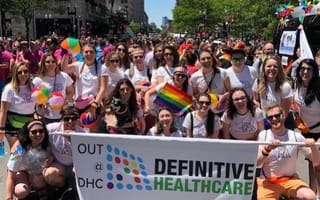During one of Kyruus’ quarterly DEI speaker series, a panelist made a distinction about their identity that had a profound impact on the company.
“These are not my ‘preferred’ pronouns,” the panelist stated. “These are my pronouns.”
Since then, Kyruus team members have incorporated pronouns into their introductions, and many have added pronouns to their names on Zoom. It’s part of a companywide initiative to improve cultural competency to ensure that all employees feel supported, included and valued.
“DEI has become embedded in our culture by how fluently and frequently it comes up within product meetings and everyday team discussions,” Lona Laughhunn, a strategic account executive at the healthtech company, said.
Many Boston tech companies are striving to do the same when it comes to building cultural competency. Grubhub, for example, has launched six employee resource groups in the past year, including Pride, Unidos and Women in Tech. Cybereason, a security software company, recently celebrated Black History Month with a campaign that highlighted Black historical events, Black art, film and literature, and provided a list of ways to support Black-owned and operated businesses.
We spoke with five Boston companies to learn more about how they’ve improved their cultural competency and why it’s so important to overall company culture.
Cultural Competency
Celebration time
In 2020, Definitive Healthcare began month-long celebrations to highlight different cultures and groups. The celebrations have included Black History Month, Women’s History Month, National Hispanic Heritage Month and others, and entail guest speakers, themed social events and charitable efforts.
What’s one step your team has taken to help employees improve their cultural competency?
We require that every employee participates in a cross-functional DEI foundations training. This is a two-hour training session, facilitated by an expert DEI consultant, that includes a workshopping element that allows participants to talk to one another and learn more about everyone’s unique experiences in the workplace. The training also gives folks a baseline on why having cultural competence is so important, and it allows us to create a shared language around these topics.
How does your company promote or celebrate cultural diversity in the workplace?
We offer a variety of opportunities for employees to engage with one another and find events and programs that resonate with them. One driving force is our employee-led affinity groups, which enable employees to come together, share common experiences and learn from one another about the different communities in our organization.
We believe employees who feel free to bring their whole selves to Definitive are empowered to do their best work and thrive.’’
In 2020, we began month-long celebrations to highlight underrepresented populations: Black History Month, Women’s History, National Hispanic Heritage and others. During these celebrations, we offer learning opportunities, guest speakers, themed social events and typically pick one nonprofit to donate to in support of the group we’re celebrating.
How does cultural competence show up in the ways your employees communicate and relate with one another?
Our efforts lead to better connectivity and camaraderie with one another, and a greater sense of belonging and inclusion. We believe employees who feel free to bring their whole selves to Definitive are empowered to do their best work and thrive.
We see the impact of our efforts through greater engagement in our company culture, more participation in our events (lunch and learns, mixers, team building, etc.), more employee involvement in our four affinity groups, and open and candid dialogue among colleagues.
A day off to give back
This year, Grubhub’s holiday calendar includes a new floating day that can be used for volunteering, wellness or recognizing a cultural event or holiday. Becky Altman, a senior manager of culture and community, said it gives employees greater flexibility and personal choice around what time away from work means outside of the traditional holiday calendar.
What’s one step your team has taken to help employees improve their cultural competency?
At Grubhub, we know that in order to create a sense of belonging we must promote building relationships with one another and provide employees with safe spaces that encourage them to be their authentic selves. We provide a variety of ways to bring our employee community together to share stories, ask questions, be vulnerable and gain empathy and compassion for one another. Examples include our GrubConnect groups (ERGs), Grublife culture events, small-group inclusive workplace discussions, and our training and speaker series.
How does your company promote or celebrate cultural diversity in the workplace?
GrubConnect groups have been instrumental in promoting and celebrating our cultural diversity. In the past year, we’ve launched six groups including Pride, Unidos, Working Parents and Women in Tech. Most recently, our Black ERG sponsored a month of activities, discussions, resources and events for Black History Month, including an event focused on talking to children about race.
We believe that being culturally competent is to respect, value and communicate with each other.’’
Providing ways to share stories and celebrate cultural events has been top of mind for us while working remotely. We recently introduced a new floating day as part of our holiday calendar that allows employees greater flexibility and personal choice around what time away from work means outside of the traditional holiday calendar. This could include time off for volunteering, wellness or recognizing a holiday/cultural event that’s meaningful to them. We encourage everyone to share stories and pictures of how they spent their time and the cultural significance of the event.
How does cultural competence show up in the ways your employees communicate and relate with one another?
We believe that being culturally competent is to respect, value and communicate with each other. It is important that we recognize that one voice does not represent all voices. Our teams are constantly asking, “Who is not in this room that needs to be and what voice are we missing?” These questions allow for critical conversations to take place and pushes us to work toward a more inclusive workplace. We collaborate with other teams and members of our GrubConnect groups to bring more perspectives into the conversation.
‘You be you’
When it comes to cultural competency at Cybereason, look no further than one of their core values. It’s UbU (as in, ‘you be you’), and it’s one of VP of People Marisa Ianelli’s favorites. “It means that we believe people can only unlock their full potential when they work somewhere that accepts them for who they are,” she said.
What’s one step your team has taken to help employees improve their cultural competency?
We have employees all over the world who represent a variety of backgrounds and cultures. For example, we speak more than 20 different languages across our organization! We recently created our UbU advisory board consisting of Cybereason employees. We began the initiative with three main objectives: learning and development, creating a mission statement and Black Lives Matter. The goal of the mission statement was to keep us focused and working toward a goal. We also felt it was very important to focus on the BLM movement and what we can do as a company both now and moving forward.
We will continue to coordinate workshops, guest speakers and other initiatives that will enable Cybereasoners to grow personally and professionally.
How does your company promote or celebrate cultural diversity in the workplace?
Our company promotes cultural diversity in many different ways. We recently celebrated Black History Month with a month-long campaign designed to inspire action, education and connection. We compiled a ton of resources to share with our employees all month long. Some of these included daily Slack posts of historical events that took place ‘on this day.’ We provided a list of ways to support Black-owned and Black-operated businesses and restaurants. We also included a section dedicated to Black art, film and literature. We provided lists of books, movies, documentaries and free virtual events.
Planning anything for a global company involves many moving parts, and it wouldn’t work unless we had trust, respect, equity, fairness and social justice.’’
We also had our employees who are a part of the Black, Indigenous and people of color (BIPOC) community speak candidly about their work and personal experiences in an internal interview, which we shared with the entire company. We’re looking forward to expanding these conversations to more groups within Cybereason.
How does cultural competence show up in the ways your employees communicate and relate with one another?
Most employees have someone on their team or someone they need to interact with on a regular basis who is not located in the same country as them. That being said, we have employees scheduling meetings in a variety of different time zones, so there are sometimes language barriers as well as cultural differences. We have to have a strong cultural competence in order to make this work. Planning anything for a global company involves many moving parts, and it wouldn’t work unless we had trust, respect, equity, fairness and social justice. We are able to get the work accomplished because we all operate using cultural competence.
DEI participation
Kyruus created a DEI committee in 2020 to improve cultural competency. It’s composed of individuals from all across the company, from entry-level employees to the CEO, said Lona Laughhunn, a strategic account executive.
What’s one step your team has taken to help employees improve their cultural competency?
One major step Kyruus took to improve cultural competency is creating our DEI committee. It’s composed of individuals from multiple cultures, races, locations, age groups and gender identities. Participation ranges from entry-level employees to our CEO. This group has been instrumental in fostering an inclusive and equitable workplace. Members from the committee have taken on various initiatives and projects to help keep DEI at the forefront of our culture and product strategy.
How does your company promote or celebrate cultural diversity in the workplace?
We have a quarterly DEI speaker series on topics such as women in leadership, how to celebrate Black History Month, LGBTQ+ leaders, economic diversity, mental health and more. Although metrics are important, we believe that storytelling is the most powerful tool we have. These panel discussions have brought forth deep and meaningful conversation on DEI topics.
I have also noticed that DEI has become embedded in our culture by how fluently and frequently it comes up...’’
In addition to the panel discussions, we send out a monthly newsletter that explains various cultural holidays and practices. Team members also share personal anecdotes. This month, we will be highlighting International Women’s Day/Women’s History Month, the Persian New Year, youth homelessness and the National Day of Silence.
How does cultural competence show up in the ways your employees communicate and relate with one another?
A previous panelist introduced themselves by saying, “These are not my ‘preferred’ pronouns. These are my pronouns.” Since then, Kyruus team members have actively incorporated pronouns into their introductions. For example, many of us have pronouns added to our names on Zoom.
I have also noticed that DEI has become embedded in our culture by how fluently and frequently it comes up within product meetings and everyday team discussions. We are seeking to make Kyruus a more diverse, inclusive and equitable workplace, and we are also eager to help the customers and the patients we serve by making our products more inclusive and accessible as well.
Sharing the love
We all have topics and things we’re passionate about. At The Predictive Index, a software tech company in Westwood, Massachusetts, they want you to share it with the company. That’s why they launched a new series of lunch-and-learn sessions this year where employees provide a crash course on a topic they love, said David Silbert, a DEI project manager.
What’s one step your team has taken to help employees improve their cultural competency?
At PI, we have a program called Change@Work. Each year, we build a roadmap of projects that are employee ideas, from educational workshops to volunteering. These projects center around inclusion and fostering a workplace that’s welcoming of all backgrounds.
Also, we put out a survey each quarter to track employee sentiment and ensure we’re driving change in areas our employees are passionate about. By having that collective engagement, we can ensure we’re practicing cultural competency at all levels of the organization.
How does your company promote or celebrate cultural diversity in the workplace?
Inclusion is central to our culture at PI. We are stronger when all employees feel empowered to share their own stories and be themselves at work.
In 2021, we’re celebrating that diversity with a series of lunch-and-learn sessions in which employees provide a crash course on a topic they love. From exploring different cultures to discussing civics and ethics, we’re encouraging all employees to further their learning and embrace what makes us different. We’re also curating a self-serve digital resource library. This hub includes books, articles, videos and podcasts that are all recommended by our employees. By contextualizing our lived experiences, we want to provide ample ways to learn from one another and take action.
We are stronger when all employees feel empowered to share their own stories and be themselves at work.’’
How does cultural competence show up in the ways your employees communicate and relate with one another?
Transparency plays a huge role in building cultural competence. Our team provides regular updates on cultural initiatives at all-company meetings, town hall sessions and through our internal website. We also encourage our employees to share feedback, named or anonymous, on what’s going well with our culture and how we can improve it.
Communication takes honesty and, for many, a fair degree of vulnerability. We strive to provide safe spaces to be vulnerable, putting on regular workshops and roundtables on topics like equity and diversity. Ultimately, we want to establish that continual feedback loop so we can continue to propel our culture forward.















